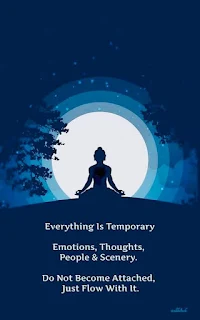Anxiety, one of the natural feelings everyone experiences at some point in their life, can be attributed to fear of the future or concern over the past.
It is an influential mental perception resulting from the fear of the unknown, the absence of religious faith, and an overreliance on personal skills.
Psychologically, worry is considered to be a form of spiritual attention deficit, in which one forgets his or her spiritual self.
The Roots of Worry
Worry grows out of the root of severance and division which is the exact opposite of the reality of union. We convince ourselves that we are lonely, and have no one to turn to within a society that is so unpredictable.
We stress over the future, over the past, about our health, money, relationships and everything else. This is like having a mental checklist of things that our minds constantly work on as if there is always something to be worried about.
Worry and the Spiritual Life
Anxiety does not only indicate a psychological status, but it also points to a mini Spiritual condition. It acts as a shield between us and our souls, so we cannot feel the inner peace, happiness, and contentment that are part of our divine nature. As the opposite of anxiety, when involved with worry we are blinded to the guidance system within our spirituality.
Worry is a form of disbelief on the part of the individual in the existence of a divine plan.
Among the amazing sources, the Bhagavad Gita provides purpose and inspiration on how to know and not worry.
Overcoming Worry Through Spirituality
Worry is not something that can be eliminated or even stifled and this is why overcoming worry cannot be explained as a process of suppressing worry. It’s more about the change of approach to it.
The Bhagavad Gita often referred to as the Gita is part of the great Indian epic the Mahabharata.
Self-analysis of the passage of the work of the Bhagavad Gita helps in understanding the causes of worry and specific advice to do away with it.
Karma yoga is one of the resources for dealing with detachment from outcomes that is practised by people.
Verse 2. 47: ''That right which is well-deserved can be followed by the prescribed tasks, But you are not entitled to the results of the actions done by you, Nor are you to be considered as the performer of the result of the activities done by you''
This way, one can avoid anxiety and stress because he or she has done his or her part in doing the right thing and the rest has been left in the hands of the almighty.
However, it should be noted that excessive hardness is not a proper attitude to choose to remain equal in success and failure.
Worrying is lessened as well as emotional fluctuation when we anchor ourselves to have a balanced view of success and failure.
Submit to God’s Will
Verse 18. 66: ''Give up all other forms of religion and just devote yourselves to Me alone; I will set you free from the wicked reactions of the world; you should not be afraid''
Compliance with religious beliefs can help to reduce the load of concern; the concept of turning to the powers above.
Faith and submission to the plan of the almighty decrease the load of the cares and concerns.
Though there is a difference between the terms mindfulness and present moment awareness, they are both closely related.
Awareness and detachment enable a person to control his or her thoughts and feelings.
''Practical suggestions on how to eliminate worry from one’s life''
Practice Detachment
Trust the process and what can come out of it, do not concern yourself with results. Remember that your grim work is not to go unrewarded but rather that which in due time will be rewarded.
Cultivate Equanimity
Have a positive attitude towards all that you do, this includes success and failure. Realize that both are included in that process and there is always something for one to learn.
Surrender and Trust
Pray, leave your concerns with the Lord/put your faith in God to take care of things. Believe that there is something better out there and someone is leading you in the right direction.
Stay Present
Meditation and deep breathing are critical in helping a person focus on the present moment and not get easily carried away by stressful thoughts. This can seriously assist to lessen a anxiousness and enhance the quality of your idea approach.
Reflect on the Teachings
Defining the recommended activity, one should state that it is crucial to read and ponder over the content of the Bhagavad Gita continually. It means that you should turn to its wisdom when you have to think about what to do concerning worry and uncertainty.
In Nutshell
The Gita presents instructions on how to eliminate the tumour of worry and attain a state of positive evolution. That is why one must learn to detach, cultivate equanimity, and surrender to divinity and presence in our lives to learn how to avoid worry and lead a joyful life. Yes, worry is a mode of existence and we should practice managing worry with the help of Gita counselling.🙏
A few words
Thanks for taking the time to read this content. Your feedback is greatly appreciated. Please consider leaving a comment, if this material resonates with you.
Thank you.












